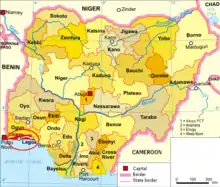2008 Ijegun pipeline explosion
On 15 May 2008 a pipeline explosion occurred in the community of Ijegun, a suburb north of Lagos, Nigeria. The explosion took place after a bulldozer struck an oil pipeline.[1][2] The Lagos police have stated that the explosion appears to be an accident, and not the work of thieves, as in past pipeline explosions near Lagos.[3] Construction workers accidentally broke an underground pipeline from which fuel started to spill out; moments later an explosion occurred.[4]

The fire started from the Isolo end of Ijegun, which spread to surrounding homes and schools. It reportedly spread through buildings with occupants inside. The Ijegun Primary School was also damaged. More than 15 homes and more than 20 vehicles were burned in the fire. Firefighters and volunteers used sand and water in attempts to extinguish the fires.[5] Forty minutes after the fire started, NNPC (Nigerian National Petroleum Corporation) firefighters arrived on the scene. The Lagos State Fire Service later arrived.[2]
| City | Date | Casualties [6] |
|---|---|---|
| Lagos | 26 December 2007 | at least 40 |
| Lagos | 26 December 2006 | at least 260 |
| Lagos | 12 May 2006 | at least 150 |
| Lagos | December 2004 | at least 20 |
| Lagos | September 2004 | at least 60 |
| Abia | June 2003 | at least 105 |
| Warri | July 2000 | at least 300 |
| Abia | March 2000 | at least 50 |
| Jesse | October 1998 | at least 200 |
Deaths
Although the Nigerian Emergency Management Agency puts the current death toll at ten, the Nigerian Red Cross claims at least 100 people have died. Other accounts state that the number dead is 39, including school children.[7] AllAfrica.com reports that the death toll is up to 43.[8] The bodies were taken to the Ikeja General Hospital. A pregnant woman and her 4-year-old son were also among the dead. The Nigerian Red Cross compiled names of the deceased and injured. They set up camps near the disaster as well. Local council and government officials claim that the actual death toll is much lower than what the Nigerian Red Cross is claiming.[9] Victims were taken to a hospital and are said to have been suffering from serious burns.[10]
It's believed that when the explosion occurred, gate men at the Ijegun Primary School initially locked the gates apparently to prevent the pupils from running into danger. But when the atmosphere became tense, the gate men and other staff were said to have run for their lives leaving everyone to their fate.[8]
At that point, students from Ijegun Comprehensive School who ran into the primary school premises were said to have jointly brought down the wall of the school to facilitate their escape.[8] Most of them were trampled on. Eight out of sixteen pupils who were rushed to Corner Stone Hospital reportedly died on 15 May and another died a day later.[8] Three residents were killed after being run over by vehicles whose drivers attempted to flee the fire zone.[8]
See also
References
- "100 killed in fire after roadworkers fracture fuel pipeline in Ijegun". The Times. London. 2008-05-17. Retrieved 2008-05-16.
- "Pipeline Blast in Nigeria Kills at least 100". Archived from the original on 21 May 2008. Retrieved 16 May 2008.
- "Red Cross says 100 dead after roadworks trigger pipeline explosion in Nigeria". Retrieved 2008-05-16.
- "Nigerian pipeline fire kills as many as 100". The Seattle Times. 2008-05-16. Archived from the original on 19 May 2008. Retrieved 2008-05-16.
- "Oil pipeline explosion kills at least 100". Archived from the original on May 19, 2008. Retrieved 2008-05-16.
- "Nigeria mourns pipeline victims". BBC News. 2007-12-27. Retrieved 2008-05-16.
- "Nigeria: 39 Die in Lagos Pipeline Fire". Archived from the original on 17 May 2008. Retrieved 2008-05-16.
- "Nigeria: Pipeline Explosion - Death Toll Rises to 43". allAfrica.com. Retrieved 2008-05-19.
- "Crowds gather at charred site of Nigerian pipeline blast". Archived from the original on 20 May 2008. Retrieved 16 May 2008.
- "Fuel explosion in Nigeria after pipeline accident". Retrieved 2008-05-16.